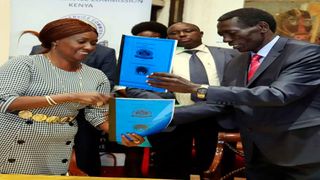
TSC CEO Nancy Macharia (left) and Knut Secretary-General Collins Oyuu after signing the 2021 to 2025 CBA at Safari Park Hotel in Nairobi last month.
| Dennis Onsongo | Nation Media GroupEducation
Premium
Agency fees: Teachers fight Kuppet, Knut
What you need to know:
- Two teachers have moved to court seeking to stop Labour ministry from gazetting fees.
- The petitioners say the intended action will have diverse psychological effects.
Teachers’ unions might have celebrated too early the benefits of agency fees from thousands of non-members as they struggle to plug their yawning financial gaps.
Two teachers have moved to court seeking to stop the Ministry of Labour from gazetting the fees from non-unionisable tutors.
The petitioners argue that they should not be subjected to payment of agency fees based on the 2021-2025 non-monetary collective bargaining agreement (CBA) as it did not result in a salary increase.
In their papers filed in Kisumu, Stephen Onditi and Paul Nzyathyu want the court to issue an injunction against the Teachers Service Commission (TSC) from effecting any orders from the Ministry of Labour on the fee.
They have listed Kenya National Union of Teachers (Knut), the Kenya Union of Post Primary Education Teachers (Kuppet), the Kenya Union of Special Needs Education Teachers (Kusnet), TSC and the Cabinet Secretary for Labour and Social Protection as respondents.
“That no agency fee should be paid on a non-monetary CBA by employees who are not members of first, second and third respondents,” state the court papers.
Diverse psychological effects
The petitioners say the intended action by the Labour and Social Protection CS to gazette agency fees will have diverse psychological effects and will be unfair under the circumstances.
Kuppet charges an agency fee of 1.8 per cent, Knut takes two per cent while Kusnet claims 1.45 per cent of basic salary.
If gazetted, over 190,000 teachers who are not affiliated to any union in both primary and secondary schools will be deducted the fee, which will then be forwarded to the bodies.
The Labour Relations Act (2007) provides that employees who are not members of a trade union but are benefiting from terms of employment negotiated in a CBA are deducted an agency fee.
Knut has a membership of 15,000, Kuppet has about 109,000 while Kenya Union of Special Education Teachers (Kusnet) has 8,000 members.
Mr Onditi argues, in an affidavit, that since the unions signed the CBAs, teachers are stressed by the thought of being forced to pay an agency fee yet the maternity and paternity leaves contained in the document are provisions of the law under the Employment Act (2007).
He claims Labour CS Simon Chelugui intends to gazette the fee to be deducted from their salaries based on a non-monetary CBA.
Unfair administrative action
“The conduct of the respondents in hastily planning and signing a non-monetary CBA on which agency fee is to be paid to the first, second and third respondents is quite suspicious and shows that they are willing to go to earn agency fee from employees who are non-members of the unions,” says Mr Onditi.
He says the unions should have followed the right process instead of acting hastily to have the CBA signed.
“Such actions by the respondents cannot have the force of law and is illegal, improper, unfair and abusive leaving the petitioners exposed to unfair administrative action which is procedurally unfair,” states the affidavit.
The petitioners also want the CBA signed between TSC and Knut be declared unconstitutional. They claim Knut does not substantially represent employees under the TSC and should not have signed the CBA.
They say TSC and Knut failed to follow the law and procedure as laid out in the Labour Relations Act when signing the CBA.
They allege that the agreement was simply signed to boost Knut financially after thousands of teachers withdrew their membership following constant wrangles with TSC.





